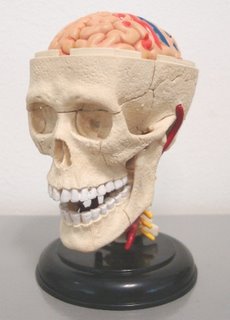 As part of Bayblab's first blog carnival on cancer research, Fresh Brainz is happy to bring you another Nobel uncle lecture.
As part of Bayblab's first blog carnival on cancer research, Fresh Brainz is happy to bring you another Nobel uncle lecture.Prof. Lee Hartwell was awarded the 2001 Nobel Prize in Physiology or Medicine for his work on cell cycle progression in the yeast. This is important to the study of cancer because cancer cells have defects in the control of cell division.
He gave this talk during the opening ceremony of a structural biology and functional genomics conference at Singapore in December last year.

His talk was entitled "Molecular diagnostics will revolutionize medicine", focusing specifically on protein-based diagnostics in the early detection of cancer.

One of the first slides that he showed immediately captured my attention.
This bar chart shows change in age-adjusted mortality between 1950 and 2002 in four major disease classes: heart diseases, cerebrovascular diseases, pneumonia/influenza and cancer.
As you can see, there is some improvement for most disease classes.
Except cancer.
In fact, there has been no significant reduction in deaths due to cancer (the bars on extreme right) in 52 years - despite the intense research into cancer therapeutics!
Very depressing.
Prof. Hartwell suggested an alternative way to improve the situation. Increasing the effectiveness of early detection techniques can help save many more lives.
Current work is focused on DNA-based therapeutics. Prof. Hartwell gave an example of how this is helpful: in esophageal cancer, which used to have a very poor prognosis.
This is because by the time clinical symptoms appear, the patient has already entered the late stage of the cancer.
Now, the outlook for patients has improved because of the availability of new screening techniques. Samples are taken from people who suffer from Barrett's esophagus and examined for DNA changes, allowing a much earlier diagnosis of cancer.
Early detection is also helpful for other cancers such as colon cancer, cervical cancer, melanomas and breast cancer.
Prof. Hartwell thinks that protein-based diagnostics are the best, because proteins are more diverse. There are only about 30,000 genes in human DNA, compared to 300,000 or more proteins produced.
However, at this time DNA-based technologies are more advanced.
There is an additional challenge. There is an abundance of protein in blood samples; however, diagnostically important proteins are often at a very low concentration.
Thus it is technically difficult to detect these signals within such high levels of noise.
Prof. Hartwell proposed a possible solution - new technologies such as the SISCAPA. He also suggested a more comprehensive approach to biomarker discovery, which is under-funded compared to cancer therapeutics.
He stressed the importance of early intervention.
During the Q&A session, a member of the audience asked:
"If cancer therapeutics has not improved in over 50 years, what went wrong?"
Prof. Hartwell pointed out that cancer research did produce successful "wonder drugs" such as Gleevec. However, he agreed that there aren't many of these. He felt that there was an over-emphasis on the therapeutics approach, because this is more rewarding to pharmaceutical companies.
He then ended his talk by emphasizing that now is the time for cancer diagnostics.
Fresh Brainz is aware of many new technologies that have the potential to become more effective than existing small molecule drugs.
One emerging group of technologies is the use of nanoparticles for accurate drug targeting, or even directly destroying the tumour using heat.
However, most of these technologies are many years away from the clinic.
For the near future, early detection is still your best bet.
Would you like to know more?
- Simplest explanation of cancer
- Take a break, have a Nobel Prize!






4 Comments:
Your points are especially valid for other cancers, too, like ovarian or prostate or lung, in which the symptoms are fairly minimal until the patient feels the need to see a physician, at which point their clinical disease is rather fulminant and widespread. It definitely highlights the need for better screening tests involving better imaging and better biomarkers. This is becoming the case for breast cancer, too, for which mammography is turning out to be not so good for screening purposes.
Yes, you're right.
I should also have emphasized that early stage drugs for many types of cancer are more effective than late stage drugs. Which underscores the need for better biomarkers in screening tests during routine health checks.
In fact, there has been no significant reduction in deaths due to cancer (the bars on extreme right) in 52 years - despite the intense research into cancer therapeutics!
I think this is rather misleading, because it glosses over the fact that there have in fact been some major advances in cancer treatment. In particular, survival from childhood cancer has increased dramatically (Eur J Cancer. 2006 Sep;42(13):2183-90 and Eur J Cancer. 2006 Sep;42(13):1981-2005), but even older-adult cancer mortality rates have been dropping since 1991 (Ann N Y Acad Sci. 2006 Sep;1076:29-53).
I'm not trying to be a pollyanna about this -- survival rates are still not very good for many types of cancer, including some of the most common kinds; incidence of some cancers is still rising; and survival of young-adult cancers has hardly changed -- but lumping everything together and claiming that there have been no advances at all is simply wrong.
To Ian:
Touché.
Prof. Hartwell did not go into the details of the types of cancer you mentioned.
But I think that his main point that the reduction of mortality rates in cancer in general are not as marked compared to heart disease and other diseases is still valid.
It is also true that there are many types of heart disease, some which have more significant advances in treatment than others.
Post a Comment